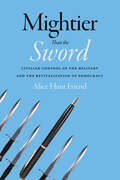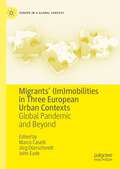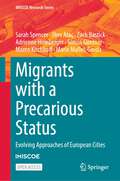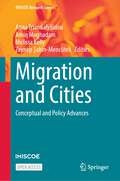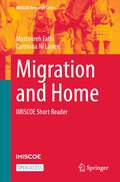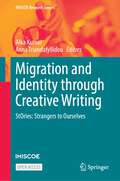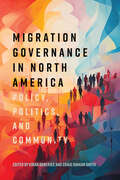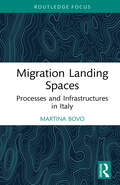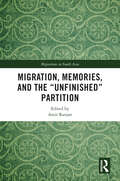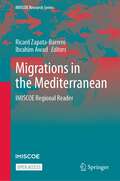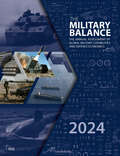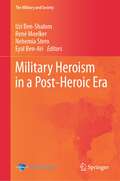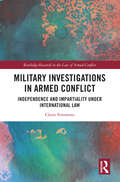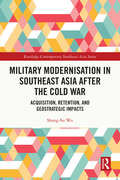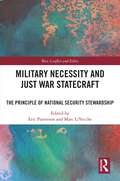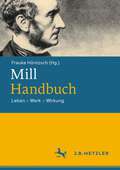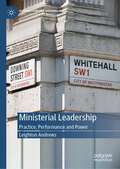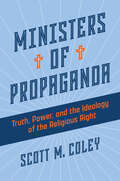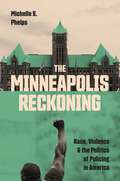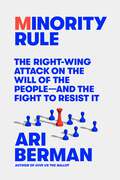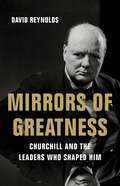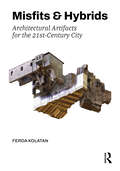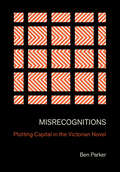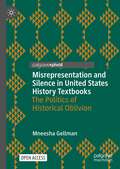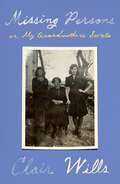- Table View
- List View
Mightier Than the Sword: Civilian Control of the Military and the Revitalization of Democracy
by Alice Hunt FriendThe civilian role in managing the military has never been more important. Today, civilian leadership of defense policy is challenged by the blurring line between war and competition and the speed of machine decision-making on the battlefield. Moreover, the legitimacy of political leaders and civil servants has been undermined by a succession of foreign policy failures and by imbalances of public faith in the military on the one hand and disapproval of civilian institutions on the other. A central question emerges: What does appropriate and effective civilian control of the military look like? Combining scholarly expertise and firsthand civilian experience in the Department of Defense, Friend argues that civilians combine authoritative status, institutional functions, and political expertise to ensure that democratic preferences over the use of force prevail. Friend focuses on the ways political context shapes whether and how civilian controllers—the civilians in professional and institutional positions with the responsibility for defense matters—exercise control over the military and each other. Mightier Than the Sword provides insights that enrich civil-military relations scholarship, as well as lessons aimed at revitalizing American democracy.
Migrants’: Global Pandemic and Beyond (Europe in a Global Context)
by Marco Caselli Jörg Dürrschmidt John EadeThis book analyses the impact of the coronavirus pandemic on three ethnic minorities in three European cities: Bangladeshi in London, Turks in Stuttgart and Peruvians in Milan. Considerable debate has emerged during the pandemic concerning its impact on minorities, and although considerable quantitative data has been generated by epidemiologists, qualitative studies also have great relevance, socially and culturally as well as institutionally. While in normal circumstances the position of migrant communities is associated with unequal access to scarce resources such as wealth, power and social prestige, the coronavirus pandemic shifted the focus to more specific variables: living in segmented or overcrowded conditions, working in jobs with higher risk exposure, difficulties with online schooling, and lack of access to health care and information.The book will therefore be of interest to researchers and students of sociology, anthropology, global studies, migration and urban studies.
Migrants with a Precarious Status: Evolving Approaches of European Cities (IMISCOE Research Series)
by Sarah Spencer Ilker Ataç Zach Bastick Adrienne Homberger Simon Güntner Maren Kirchhoff Marie Mallet-GarciaThis open access book is an exploration of city responses to migrants with a precarious status in Europe. It provides new evidence and analysis from research on three cities in Austria, Germany and the UK: Vienna, Frankfurt and Cardiff. The book explores strategies and services of municipal authorities towards precarious migrants and their cooperation with non-governmental organisations (NGOs) in service provision. It focuses on healthcare, education, housing and access to advice; and particular attention is given to the situation of women.The book develops the concept of precarity in relation to migration status, and of horizontal governance arrangements within municipal authorities. It explores the tension between exclusion and inclusion of migrants who have limited rights of access to welfare services, and contributes evidence on the factors shaping municipal policy making, as well as on the framing of rationales for providing access to essential services.
Migration and Cities: Conceptual and Policy Advances (IMISCOE Research Series)
by Melissa Kelly Anna Triandafyllidou Zeynep Şahin-Mencütek Amin MoghadamThis open access book brings together different perspectives on migration and the city that are usually discussed separately, to show the special character of the urban context as a territorial and political space where people coexist, whether by choice or necessity. Drawing on heterogeneous situations in cities in different world regions (including Europe, North America, the Middle East, South, Southeast and East Asia and the Asia Pacific) contributions to this volume examine how migration and the urban context interact in the twenty-first century. The book is structured in four parts. The first looks at cities as hubs of cultural creativity, exploring the many dimensions of cultural diversity and identity as they are negotiated in the urban context. The second focuses on what lies outside the large urban centres of today, notably suburbs, while the third part engages with migration and diversity in small and mid-sized cities, many of which have adopted strategies to welcome growing numbers of migrants. Last but not least, the fourth part looks at the challenges and opportunities that asylum-seeking and irregular migration flows bring to cities. By providing a variety of empirical cases based on various world regions, this book is a valuable resource for researchers, students and policy makers.
Migration and Home: IMISCOE Short Reader (IMISCOE Research Series)
by Mastoureh Fathi Caitríona Ní LaoireThis open access short reader offers an intersectional perspective on the meaning of home in migration. The book provides a pathway through existing scholarship on home and migration, exploring how intersectional power relations and transnational migration regimes are felt, experienced, lived and navigated by migrants, who are differently positioned, in the making and imagining of home. The meanings associated with home are composed of the interrelation of places, spaces, people, social relations, materialities, emotions and temporalities. These multiple aspects highlight the complexities inherent in the idea of home, which come to the fore particularly when one moves location. Migration and Home explores these issues by focusing on specific key aspects of home in migration: home and gender; home and age; home and materiality; and home and migration status, class and race. It proposes the concept of structural im/possibilities as a framework for understanding the power relations and structures that shape where, when and for whom home in migration is more, or less, possible.
Migration and Identity through Creative Writing: StOries: Strangers to Ourselves (IMISCOE Research Series)
by Alka Kumar Anna TriandafyllidouThis open access book brings together storytelling and self-narrative, creative writing and narrative enquiry to explore a variety of topics in migration from an experiential lens. The volume is hybrid and multi-genre as it contains both scholarly chapters grounded in academic perspectives, as well as personal essays and creative non-fiction. In addition to critical reflections on key migration topics and concepts – like, identity and diversity, integration and agency, transnationalism and return – the scholarly chapters also propose a particular methodology for ‘workshopping’ migration narratives, and writing about (personal) lived experiences through iterations of scientific reflection, narrative enquiry, and creative imagination. The book explores the potential of a new conceptual paradigm and methodological process to learn more, and also `differently,’ about the migration experience. Finally, this volume asks a bigger question too – how do we define the boundaries of research; is it possible to entirely separate the spatial, temporal and methodological parameters in which projects are developed and pursued; and how can the specifics of these multiple contexts contribute to shaping the knowledge being produced?
Migration Governance in North America: Policy, Politics, and Community (McGill-Queen's Refugee and Forced Migration Studies)
by Kiran Banerjee Craig Damian SmithMillions of people arrive in North America each year, including highly skilled immigrants and temporary workers, refugees, and international students. Migration, border control, and asylum are ongoing flashpoints in Canadian, American, and Mexican relations, and deeply affect the domestic politics and economies of each country.While migration has emerged as an only increasingly charged topic in public discourse, research has largely focused on North America’s lack of regional integration around mobility, often neglecting aspects of regional cooperation, hierarchy, and global engagement. Migration Governance in North America advances that conversation by examining the complex dynamics of mobilities across the continent through contemporary analysis and historical context. Situating North America within the global migration landscape, contributors from Canada, the United States, Mexico, and Europe unpack such issues as temporary labour mobility, border security, asylum governance, refugee resettlement, and the role of local actors and activists in coping with changing policies and politics.In the wake of a series of significant and likely enduring changes across the continent this flagship volume puts policy developments and migrant organizing in conversation across borders, investigates often contentious domestic, regional, and global migration politics, and reveals how intersecting policy frameworks affect the movement of people.
Migration Landing Spaces: Processes and Infrastructures in Italy (Routledge Studies in Development, Mobilities and Migration)
by Martina BovoThis book looks at migrant landing spaces, exploring the processes and infrastructures which people encounter as they navigate urban spaces along the central Mediterranean route.The book argues that there remains a theoretical and practical difficulty in grasping the complexity of migrant arrivals. Migrants are often unsure whether they will stay or leave, their mobility is uncertain. Despite this, they face rigid binaries and categories within administrative policy and planning which tries to pin them down as either permanent or temporary. Drawing on extensive original research in southern Italy, this book suggests that we should instead think of ‘landing spaces’: parts of the city that work as infrastructures for landing, that allow for an open and dynamic use of the urban space and provide opportunities for encounter and information exchange as migrants consider their next steps.Combining an ethnographic gaze with insights from urban planning, architecture, geography, social sciences and migration studies, this book invites us to look closer at the interactions between people, practices and places as migrants land in Europe.
Migration, Memories, and the "Unfinished" Partition (Migrations in South Asia)
by Amit RanjanThis book looks at migration through the lens of the Partition of India in 1947. The Partition uprooted millions of people from their homelands. This volume examines the initial difficulties faced by the refugees in settling down in their adopted land. It analyses the state’s efforts in facilitating the movement of refugees, the processes it initiated to resettle them after Partition, and the extent to which it was successful. This book also investigates the links between socio-political developments in contemporary India, Pakistan, and Bangladesh as a result of the Partition.Drawing on archival sources, oral histories and literary representations, the contributing authors discuss and analyse the experiences of the migrated population. Part of the Migrations in South Asia series, this book will be an important read for scholars and researchers of migration studies, refugee studies, Partition studies, Indian history, Indian politics, and South Asian studies.
Migrations in the Mediterranean: IMISCOE Regional Reader (IMISCOE Research Series)
by Ricard Zapata-Barrero Ibrahim AwadThis open access Regional Reader describes population movement circulating within the Mediterranean area, for any reason or from any region, be them European, African, Asian or originating from any of the Mediterranean shores. It showcases a plurality of approaches to and applications of Mediterranean migration, contributing to a regional approach to migration studies, thereby defending this regional approach by scaling Mediterranean migration issues. This book covers a large set of questions related Mediterranean migrations to the migration research agenda, such as: market and economy, politics and policies, super-diversity and intersectionality, media, society, welfare and the environment through five main parts: Geo-political Mediterranean Relations, Governance, Policies and Politics, Mobility drivers and Agency, Cities, History and Social Transformations, and Economy and Labour Markets. This Regional Reader provides an interesting read to scholars, researchers, but also policy makers and civil society organizations’ high representatives, international foundations and institutions interested in linking the Mediterranean and migration.
The Military Balance 2024 (The Military Balance)
by The International for Strategic Studies (IISS)The Military Balance has been published since 1959. The 2024 edition provides an open-source assessment of the armed forces and equipment inventories of over 170 countries, with accompanying defence economics data. In addition to detailed country data, The Military Balance assesses, region-by-region, important military issues. It includes graphics to illustrate defence personnel, equipment, and procurement developments. The 65th edition examines emerging lessons from Russia’s full-scale invasion of Ukraine, details Chinese military activity around Taiwan, and identifies developments in uninhabited aerial vehicle exports. The accompanying wallchart spotlights the important issues around critical national infrastructure in the Euro-Atlantic. The book draws on the breadth of data in the Military Balance+ online database. The Military Balance and Military Balance+ are indispensable sources of information for those involved in defence and security policymaking, analysis, and research.
Military Heroism in a Post-Heroic Era (The Military and Society)
by Uzi Ben-Shalom René Moelker Nehemia Stern Eyal Ben-AriThis book explores the variety of forms that individual heroism and sacrifice can take in the context of contemporary military conflicts. It addresses three key questions: How has an enduring ideal of heroism been transformed by the nature of modern warfare? Are we now witnessing the emergence of new forms of exemplary military behavior? And, have new ideals of heroism (and by association, sacrifice or bravery) been added to older forms in the recent past? The book advocates viewing the concept of military heroism as a moral category, in which its theoretical definition and empirical practice reflect those factors that are seen as being vital for society itself. The key theoretical and topical challenges addressed in the respective chapters focus on how ideas of heroism become entwined with issues of individualization (bolstered by the cultural assumptions of neo-Liberalism), the spread of the human rights discourse, and the judicialization, marketization and mediatization of armedforces. The book was written by experts on military studies, including many who are currently active military personnel. It includes contributions from a variety of disciplines, e.g. anthropology, sociology, psychology, and political science.
Military Investigations in Armed Conflict: Independence and Impartiality under International Law (Routledge Research in the Law of Armed Conflict)
by Claire SimmonsAn allegation is made that a war crime was committed by a soldier during a conflict. Who should investigate the allegation? How should they investigate?This book explores a topic of critical importance in legal and policy discussions surrounding the accountability of military operations in armed conflict, and problematises some presumptions that are often made about the topic. The work provides the international legal framework necessary to address these questions and establishes the precise standards of independence and impartiality as applicable to investigations in armed conflict. It questions the assumption that the standards of independence and impartiality of investigations should be measured in the same way that we measure these standards for judges, courts, and tribunals. It also explores the ways in which military institutions and culture, as well as the context of armed conflict, may impact on the effectiveness of investigations or the perception of justice by those affected. By demonstrating the precise ways in which military investigations can contribute to or hinder the effectiveness of investigations, the book clarifies States’ responsibilities with regard to their accountability efforts for serious violations of international law in armed conflict. The work will be a valuable resource for academics, researchers, and policy-makers working in the areas of international humanitarian law, international human rights law, as well as political science and military ethics.
Military Modernisation in Southeast Asia after the Cold War: Acquisition, Retention, and Geostrategic Impacts (Routledge Contemporary Southeast Asia Series)
by Shang-Su WuSoutheast Asian countries represent a wide range of approaches to military modernisation due to their great diversity in politics, economies, geography and other factors. Bounded by the Pacific and Indian Oceans and located between China and India is the setting for the geostrategic impacts of military modernisation in Southeast Asian countries.Differing from previous research focused on military acquisition, this book additionally covers retention of assets and carefully examines the ageing issues that affect readiness and capabilities. In doing so, it provides a comprehensive view of military modernisation. This book also compares each country’s situation in the region in terms of military strength and security challenges to elaborate on the geostrategic impacts of military modernisation. The ten cases of military modernisation in the post-Cold War context provide rich content for readers to explore the evolution of military modernisation in developing countries after 1991.This book sheds light on security studies of Southeast Asia and is a useful resource for academic researchers, policy-makers and defence practitioners.
Military Necessity and Just War Statecraft: The Principle of National Security Stewardship (War, Conflict and Ethics)
by Eric PattersonThis book analyses the concept of military necessity and just war thinking, and argues that it should be seen as a vital moral principle for leaders. The principle of military necessity is well-understood in the manuals of modern militaries and is recognized in the war convention. It is the idea that battlefield commanders should make every effort to win on a local battlefield, within legal means, and using proportionate and discriminating weapons and tactics. Every legal textbook on war includes military necessity as a foundational principle within the jus in bello (ethics of fighting war) alongside principles of proportionality and distinction, and it is taught in every Western military academy. Even the International Committee of the Red Cross lauds the concept as a cardinal principle of warfare. However, unlike legal scholarship, pick up a book by almost any just war thinker in philosophy, theology, or the social sciences, and the concept is missing altogether. This volume returns military necessity to just war thinking and lays out the argument for doing so. Each contributor taps into one of the many dimensions of military necessity, such as its relationship to jus ad bellum (ethics of going to war) categories (e.g. right intention), its relationship to jus in bello categories, or its application in foreign policy and military doctrine. Case studies in the book point out the practical moral dimensions of military necessity in cases from the targeted killing of terrorists to battlefield decisions that led to the use of the atomic bomb at Hiroshima. This book will be of interest to students of just war theory, military ethics, statecraft and International Relations.
Mill-Handbuch: Leben – Werk – Wirkung
by Frauke HöntzschJohn Stuart Mill (1806–1873) gehört im angelsächsischen Raum seit jeher zu den Klassikern der Ideengeschichte. Aber auch im deutschsprachigen Raum wird er immer stärker rezipiert: Viele seiner Hauptschriften wurden neu editiert, sein Denken erfreut sich über die disziplinären Grenzen hinweg bis hinein in die Feuilletons wachsender Aufmerksamkeit. Das liegt nicht zuletzt an Mills ungewöhnlich undogmatischer Denkhaltung, die sich in der Berücksichtigung und Synthese verschiedenster Denkrichtungen niederschlägt. Seine Schriften zeugen von einem differenzierten Blick auf gesellschaftspolitische Zusammenhänge, was sie auch für moderne Debatten vielfältig anschlussfähig macht. Das Handbuch stellt John Stuart Mills Leben, die wichtigsten Einflüsse auf sein Denken, sein Werk und die zentralen Konzepte sowie die Rezeption seines Denkens im Rahmen unterschiedlicher Diskurse vor.
Ministerial Leadership: Practice, Performance and Power (Understanding Governance)
by Leighton AndrewsMinisterial Leadership offers a practice-based account of how ministers in UK governments perform their roles and exercise leadership in their spaces of activity. Drawing on the unique Ministers Reflect archive of the Institute for Government, which is an open and growing resource of over 140 ministerial interviews at UK and devolved government levels, as well as other ministerial reflections, the book addresses the literature on ministerial life and political leadership, and develops new concepts for examining ministerial leadership in different spheres. It argues that the relationship between ministers and civil servants has changed significantly in recent decades, as ministers place greater emphasis on delivery and implementation. The book adopts a theoretically pluralist approach with the intention of offering a valuable teaching aid for existing and new courses. It will appeal to all those interested in public policy and governance.
Ministers of Propaganda: Truth, Power, and the Ideology of the Religious Right
by Scott M. ColeyScott Coley exposes the inner workings of the religious right&’s propaganda—and how Christians can resist it. Good evangelical Christians are Republican. It seems like it&’s always been this way. That means the propaganda is working. Scott Coley trains a critical eye on the fusion of evangelicalism and right-wing politics in Ministers of Propaganda. This timely volume unravels rhetoric and biblical prooftexting that support Christo-authoritarianism: an ideology that presses Christian theology into the service of authoritarian politics. Coley&’s historically informed argument unsettles evangelical orthodoxy on issues like creation science or female leadership—convictions not as unchanging as powerful religious leaders would have us believe. Coley explains that we buy into propaganda because of motivated reasoning, and when we are motivated by perceived self-interest, the Christian message is easily corrupted. But if we recover Jesus&’s commandment to love our neighbors as ourselves, right-wing propaganda will lose its power. Any reader troubled by American evangelicals&’ embrace of racism, misogyny, and other unchristian views will find answers and hope in these pages.
The Minneapolis Reckoning: Race, Violence, and the Politics of Policing in America
by Michelle S. PhelpsChallenges to racialized policing, from early reform efforts to BLM protests and the aftermath of George Floyd&’s murder The eruption of Black Lives Matter protests against police violence in 2014 spurred a wave of police reform. One of the places to embrace this reform was Minneapolis, Minnesota, a city long known for its liberal politics. Yet in May 2020, four of its officers murdered George Floyd. Fiery protests followed, making the city a national emblem for the failures of police reform. In response, members of the Minneapolis City Council pledged to &“end&” the Minneapolis Police Department. In The Minneapolis Reckoning, Michelle Phelps describes how Minneapolis arrived at the brink of police abolition.Phelps explains that the council&’s pledge did not come out of a single moment of rage, but decades of organizing efforts. Yet the politics of transforming policing were more complex than they first appeared. Despite public outrage over police brutality, the council&’s initiatives faced stiff opposition, including by Black community leaders who called for more police protection against crime as well as police reform. In 2021, voters ultimately rejected the ballot measure to end the department. Yet change continued on the ground, as state and federal investigations pushed police reform and city leaders and residents began to develop alternative models of safety.The Minneapolis Reckoning shows how the dualized meaning of the police—as both the promise of state protection and the threat of state violence—creates the complex politics of policing that thwart change. Phelps&’s account of the city's struggles over what constitutes real accountability, justice, and safety offers a vivid picture of the possibilities and limits of challenging police power today.
Minority Rule: The Right-Wing Attack on the Will of the People—and the Fight to Resist It
by Ari BermanA riveting account of the decades-long effort by reactionary white conservatives to undermine democracy and entrench their power—and the movement to stop them.The mob that stormed the Capitol on January 6, 2021, represented an extreme form of the central danger facing American democracy today: a blatant disregard for the will of the majority. But this crisis didn’t begin or end with Donald Trump’s attempt to overturn the 2020 election. Through voter suppression, election subversion, gerrymandering, dark money, the takeover of the courts, and the whitewashing of history, reactionary white conservatives have strategically entrenched power in the face of a massive demographic and political shift. Ari Berman charts these efforts with sweeping historical research and incisive on-the-ground reporting, chronicling how a wide range of antidemocratic tactics interact with profound structural inequalities in institutions like the Electoral College, the Senate, and the Supreme Court to threaten the survival of representative government in America.“The will of the people,” wrote Thomas Jefferson in 1801, “is the only legitimate foundation of any government.” But that foundation is crumbling. Some counter-majoritarian measures were deliberately built into the Constitution, which was designed in part to benefit a small propertied upper class, but they have metastasized to a degree that the Founding Fathers could never have anticipated, undermining the very notion of “a government of the people, by the people, and for the people.” Chilling and revelatory, Minority Rule exposes the long history of the conflict between white supremacy and multiracial democracy that has reached a fever pitch today—while also telling the inspiring story of resistance to these regressive efforts.
Mirrors of Greatness: Churchill and the Leaders Who Shaped Him
by David ReynoldsA new biography of Winston Churchill, revealing how his relationships with the other great figures of his age shaped his own triumphs and failures as a leader Winston Churchill remains one of the most revered figures of the twentieth century, his name a byword for courageous leadership. But the Churchill we know today is a mixture of history and myth, authored by the man himself. In Mirrors of Greatness, prizewinning historian David Reynolds reevaluates Churchill&’s life by viewing it through the eyes of his allies and adversaries, even his own family, revealing Churchill&’s lifelong struggle to overcome his political failures and his evolving grasp of what &“greatness&” truly entailed. Through his dealings with Adolf Hitler and Neville Chamberlain, we follow Churchill&’s triumphant campaign against Nazi Germany. But we also see a Churchill whose misjudgments of allies and rivals like Roosevelt, Stalin, Gandhi, and Clement Attlee blinded him to the British Empire&’s waning dominance on the world stage and to the rising popularity of a postimperial, socialist vision of Great Britain at home. Magisterial and incisive, Mirrors of Greatness affords Churchill his due as a figure of world-historical importance and deepens our understanding of his legend by uncovering the ways his greatest contemporaries helped make him the man he was, for good and for ill.
Misfits & Hybrids: Architectural Artifacts for the 21st-Century City
by Ferda KolatanContemporary cities are shaped by the unlikely adjacencies of objects that are vastly different in kind, origin, and scale: buildings, infrastructure, and other urban components that over time accumulate into mismatched configurations. However, despite the ubiquity of these oddities and their impact on the city, we rarely give them much consideration. In Misfits & Hybrids, Ferda Kolatan explores the untapped potential in these unexpected conditions for a new kind of architecture. A diverse array of projects, developed in Kolatan’s design studios at the University of Pennsylvania Weitzman School of Design, illustrates how hybrid artifacts can reveal the often overlooked cultural, socio-political, and material histories of a site, fostering design tactics invested in reinventing the existing. Set within the cosmopolitan megacities of Istanbul, Cairo, and New York, the projects are conceived as real fictions, conjuring novel narrative, aesthetic, and representational forms to reflect the pluralistic postindustrial city.
Misrecognitions: Plotting Capital in the Victorian Novel
by Ben ParkerMisrecognitions mounts a vigorous defense of the labyrinthine plotting of Victorian novels, notorious for their implausible concluding revelations and coincidences. Critics have long decried Victorian recognition scenes—the reunions and retroactive discoveries of identity that too conveniently bring the story to a close—as regrettable contrivances. Ben Parker counters this view by showing how these recognition scenes offer a critique of the social and economic misrecognitions at work in nineteenth-century capitalism. Through a meticulous analysis of novels by Charles Dickens, Anthony Trollope, and Henry James, as well as Arthur Conan Doyle's Sherlock Holmes stories, Misrecognitions tracks how the Victorian novel translates the financialized abstractions of capital into dramas of buried secrets and disguised relations. Drawing on Karl Marx's account of commodity fetishism and reification, Parker contends that, by configuring capital as an enigma to be unveiled, Victorian recognition scenes dramatize the inversions of agency and temporality that are repressed in capitalist production. In plotting capital as an agent of opacity and misdirection, Victorian novels and their characteristic dialectic of illusion and illumination reveal the plot hole in capitalism itself.
Misrepresentation and Silence in United States History Textbooks: The Politics of Historical Oblivion (Palgrave Studies in Educational Media)
by Mneesha GellmanThis open access book investigates how representation of Native Americans and Mexican-origin im/migrants takes place in high school history textbooks. Manually analyzing text and images in United States textbooks from the 1950s to 2022, the book documents stories of White victory and domination over Black, Indigenous, and People of Color (BIPOC) groups that disproportionately fill educational curricula. While representation and accurate information of non-White perspectives improves over time, the same limited tropes tend to be recycled from one textbook to the next. Textual analysis is augmented by focus groups and interviews with BIPOC students in California high schools. Together, the data show how misrepresentation and absence of BIPOC perspectives in textbooks impact youth identity. This book argues for an innovative rethinking of US history curricula to consider which stories are told, and which perspectives are represented.
Missing Persons: or, My Grandmother's Secrets
by Clair WillsBlending memoir with social history, Clair Wills movingly explores the holes in the fabric of modern Ireland, and in her own family story."Clair Wills shines a brilliant, unsparing light into the dark recesses of her family’s history—and the history of Ireland. Missing Persons is a stunningly eloquent exploration of how truth-telling, secret-keeping, and outright lies are part of all family stories—indeed, the stories that unite all communities—and how truths, secrets and lies can both protect and destroy us." —Jeannette Walls, author of The Glass Castle and Hang the MoonWhen Clair Wills was in her twenties, she discovered she had a cousin she had never met. Born in a mother-and-baby home in 1950s Ireland, Mary grew up in an institution not far from the farm where Clair spent happy childhood summers. Yet Clair was never told of Mary’s existence. How could a whole family—a whole country—abandon unmarried mothers and their children, erasing them from history?To discover the missing pieces of her family’s story, Clair searched across archives and nations, in a journey that would take her from the 1890s to the 1980s, from West Cork to rural Suffolk and Massachusetts, from absent fathers to the grief of a lost child.There are some experiences that do not want to be remembered. What began as an effort to piece together the facts became an act of decoding the most unreliable of evidence—stories, secrets, silences. The result is a moving, exquisitely told account of the secrets families keep, and the violence carried out in their name.
